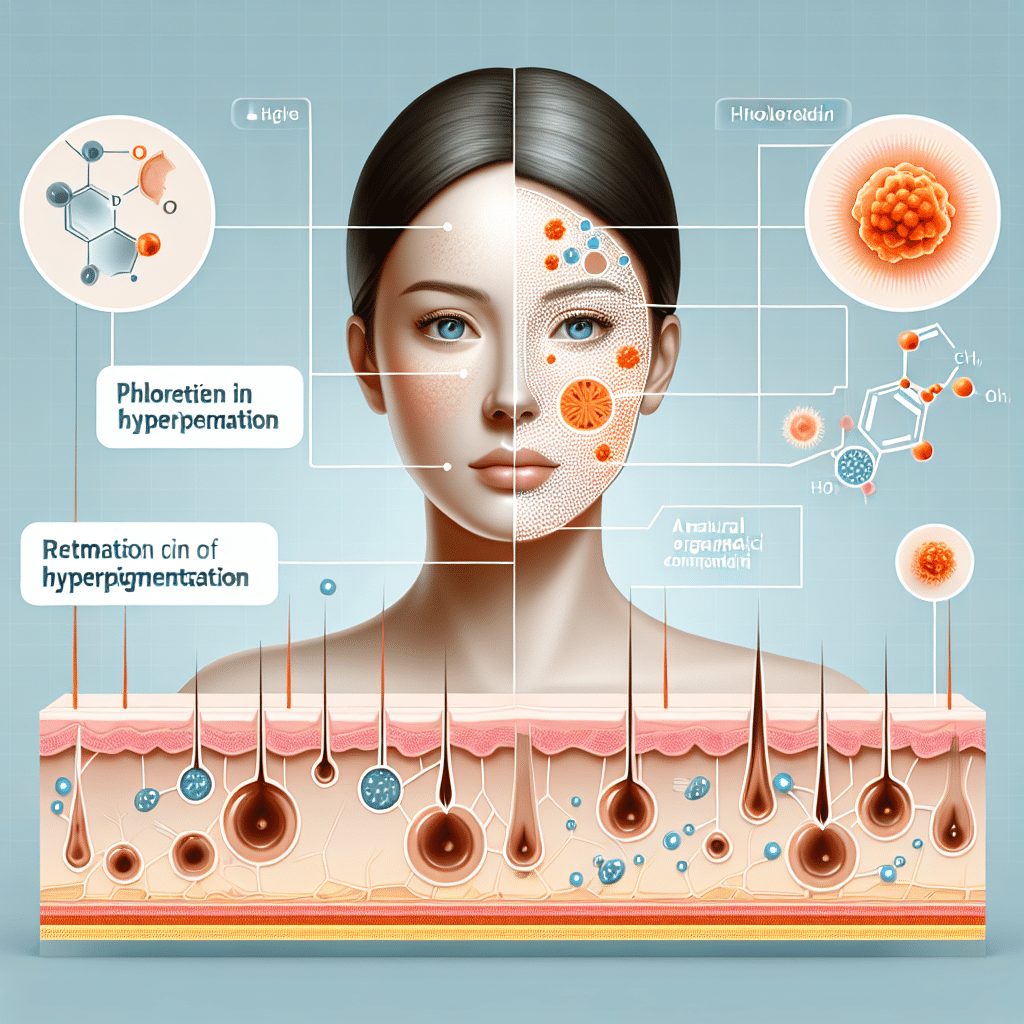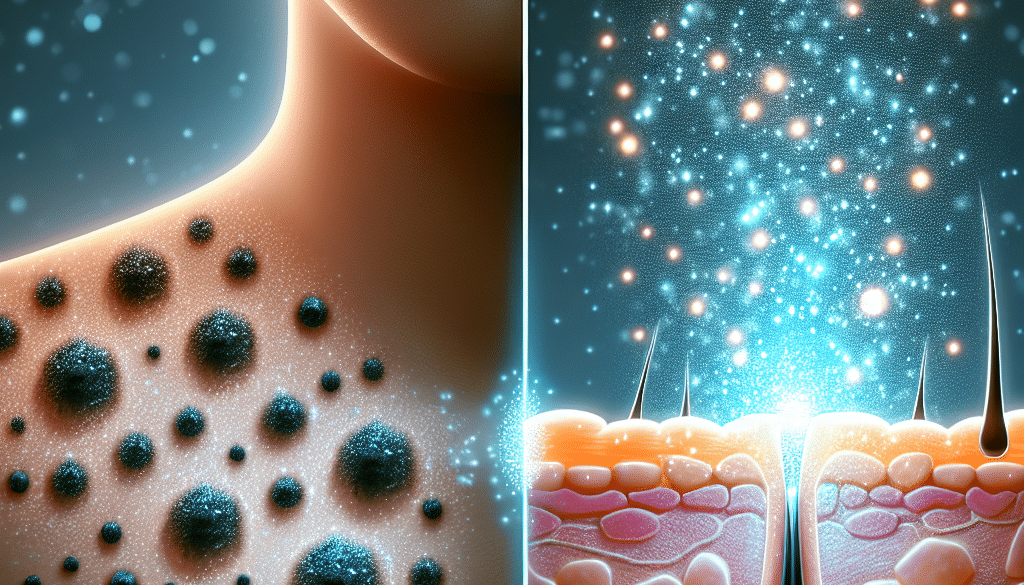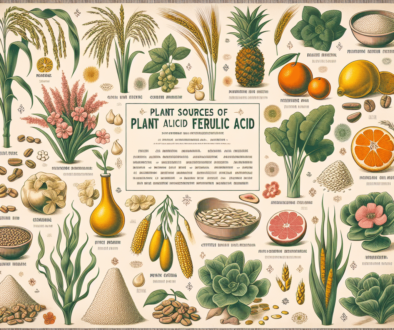Phloretin: Tackling Hyperpigmentation Effectively
-
Table of Contents
- Phloretin: The Effective Solution for Hyperpigmentation Concerns
- Understanding Hyperpigmentation
- Phloretin: A Natural Antioxidant
- The Mechanism of Phloretin Against Hyperpigmentation
- Clinical Studies and Evidence
- Comparing Phloretin with Other Hyperpigmentation Treatments
- How to Incorporate Phloretin into Your Skincare Routine
- Conclusion: Phloretin as a Promising Ally in Skin Health
- Discover ETprotein’s Premium Protein Products
Phloretin: The Effective Solution for Hyperpigmentation Concerns

Hyperpigmentation, a common dermatological condition characterized by darkened patches of skin, can be a source of cosmetic concern for many individuals. It arises from an overproduction of melanin, the pigment responsible for skin color, often triggered by factors such as sun exposure, hormonal changes, and inflammation. While there are numerous treatments available, phloretin has emerged as a promising ingredient in the fight against hyperpigmentation. This article delves into the science behind phloretin and its efficacy in tackling this skin issue.
Understanding Hyperpigmentation
Before exploring the benefits of phloretin, it is essential to understand the underlying causes of hyperpigmentation. The condition can manifest in various forms, including melasma, sunspots, and post-inflammatory hyperpigmentation. Each type has distinct triggers, but the common denominator is the excess production of melanin by melanocytes, the cells in the skin responsible for pigment.
- Melasma is often associated with hormonal changes, such as those occurring during pregnancy or due to contraceptive use.
- Sunspots, also known as age spots or liver spots, are typically caused by prolonged sun exposure over the years.
- Post-inflammatory hyperpigmentation occurs after an inflammatory skin event, such as acne, eczema, or injury to the skin.
Phloretin: A Natural Antioxidant
Phloretin is a natural compound found in apples and the root bark of apple trees. It belongs to a class of plant compounds known as dihydrochalcones, which are known for their antioxidant properties. Antioxidants are crucial in skincare as they combat free radicals, unstable molecules that can cause oxidative stress and damage to skin cells, potentially leading to premature aging and pigmentation issues.
The Mechanism of Phloretin Against Hyperpigmentation
Phloretin’s effectiveness in treating hyperpigmentation lies in its multifaceted approach to skin health. It works by inhibiting the activity of tyrosinase, an enzyme essential for melanin production. By suppressing tyrosinase, phloretin reduces melanin synthesis, thereby lightening hyperpigmented areas over time.
- Phloretin inhibits the synthesis of melanin by affecting the expression of genes involved in the pigmentation process.
- It possesses anti-inflammatory properties that help in reducing the occurrence of post-inflammatory hyperpigmentation.
- As an antioxidant, phloretin protects the skin from oxidative stress, which can trigger melanin production.
Clinical Studies and Evidence
Several studies have highlighted the potential of phloretin in treating hyperpigmentation. For instance, research published in the “Journal of Cosmetic Dermatology” demonstrated that a topical formulation containing phloretin, along with other active ingredients, significantly improved melasma in study participants. Another study in the “International Journal of Dermatology” found that phloretin could effectively reduce the appearance of age spots and improve overall skin tone.
Comparing Phloretin with Other Hyperpigmentation Treatments
When compared to other hyperpigmentation treatments, such as hydroquinone, kojic acid, and retinoids, phloretin stands out due to its safety profile and lack of severe side effects. Hydroquinone, for example, is a potent skin-lightening agent but has been associated with potential risks, including skin irritation and, with prolonged use, ochronosis (a bluish-black discoloration of the skin).
- Phloretin is gentle on the skin and suitable for long-term use.
- It can be combined with other skincare ingredients to enhance its efficacy without causing adverse reactions.
- Phloretin is also beneficial for overall skin health, providing antioxidant protection and promoting a more even skin tone.
How to Incorporate Phloretin into Your Skincare Routine
Incorporating phloretin into your skincare routine is straightforward. It is available in various topical formulations, including serums, creams, and lotions. For best results, it should be applied to clean skin, typically once or twice daily, depending on the product’s concentration and instructions. As with any skincare treatment, consistency is key to achieving noticeable improvements.
Conclusion: Phloretin as a Promising Ally in Skin Health
In conclusion, phloretin is a potent and safe ingredient for those looking to address hyperpigmentation. Its ability to inhibit melanin production, coupled with its antioxidant and anti-inflammatory properties, makes it an effective and comprehensive treatment option. With a growing body of research supporting its use and an excellent safety profile, phloretin is poised to become a staple in skincare regimens aimed at achieving a more even and radiant complexion.
Discover ETprotein’s Premium Protein Products
While phloretin tackles hyperpigmentation, maintaining overall health is essential for healthy skin. ETprotein offers a range of high-quality protein products that can complement your skincare routine by supporting your nutritional needs. Their organic and non-GMO protein powders are perfect for anyone looking to enhance their diet with clean, plant-based proteins.
Whether you’re formulating a new skincare product or seeking to improve your health regimen, ETprotein’s offerings can provide the quality and purity you need. Their commitment to excellence ensures that you receive the best in protein and nutritional supplements.
About ETprotein:
ETprotein, a reputable protein and L-(+)-Ergothioneine (EGT) Chinese factory manufacturer and supplier, is renowned for producing, stocking, exporting, and delivering the highest quality organic bulk vegan proteins and L-(+)-Ergothioneine. They include Organic rice protein, clear rice protein, pea protein, clear pea protein, watermelon seed protein, pumpkin seed protein, sunflower seed protein, mung bean protein, peanut protein, and L-(+)-Ergothioneine EGT Pharmaceutical grade, L-(+)-Ergothioneine EGT food grade, L-(+)-Ergothioneine EGT cosmetic grade, L-(+)-Ergothioneine EGT reference grade and L-(+)-Ergothioneine EGT standard. Their offerings, characterized by a neutral taste, non-GMO, allergen-free attributes, with L-(+)-Ergothioneine purity over 98%, 99%, cater to a diverse range of industries. They serve nutraceutical, pharmaceutical, cosmeceutical, veterinary, as well as food and beverage finished product distributors, traders, and manufacturers across Europe, USA, Canada, Australia, Thailand, Japan, Korea, Brazil, and Chile, among others.
ETprotein specialization includes exporting and delivering tailor-made protein powder and finished nutritional supplements. Their extensive product range covers sectors like Food and Beverage, Sports Nutrition, Weight Management, Dietary Supplements, Health and Wellness Products, and Infant Formula, ensuring comprehensive solutions to meet all your protein needs.
As a trusted company by leading global food and beverage brands and Fortune 500 companies, ETprotein reinforces China’s reputation in the global arena. For more information or to sample their products, please contact them and email sales(at)ETprotein.com today.












